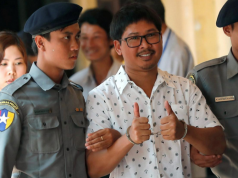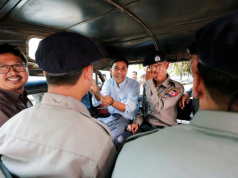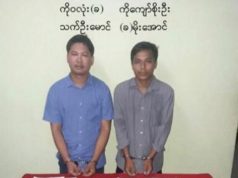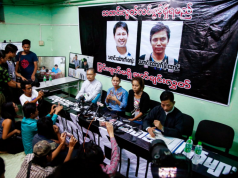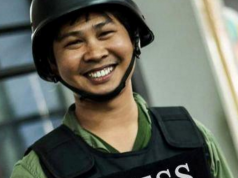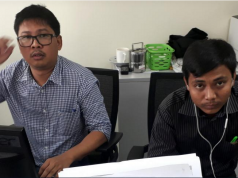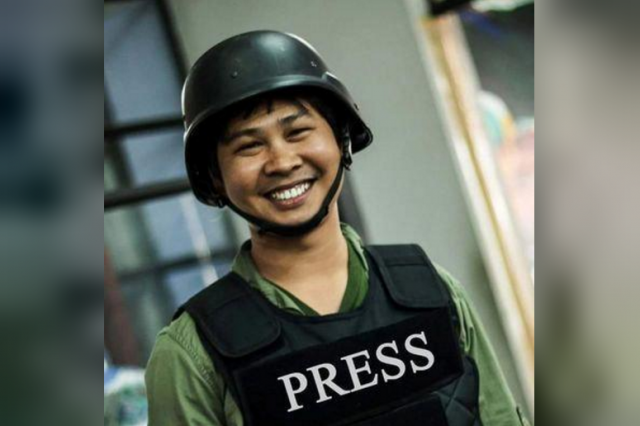
Myanmar has accused Reuters reporters Wa Lone, 31, and Kyaw Soe Oo, 27, of breaching the country’s Official Secrets Act, a little-used hangover from colonial rule. Sam Zarifi, secretary general of the International Commission of Jurists (ICJ), said the law can ensnare working journalists “at any time”.
The two reporters were arrested on Tuesday evening after they were invited to meet police officers for dinner in the north of Yangon.
The Ministry of Information said they had “illegally acquired information with the intention to share it with foreign media”, and published a photo of the pair in handcuffs standing behind a table with documents laid on it.
ORIGINS OF THE OFFICIAL SECRETS ACT
The law dates back to 1923, when Myanmar, then known as Burma, was a province of British India. At the time British administrators worried that rival powers could seek to exploit anti-colonial unrest in its South Asian empire.
The act, which amended earlier anti-spying legislation, was controversial in India even at the time, according to a history published in 2009 by the United Service Institution of India, a New Delhi-based think tank.
British military officers pushed for the stronger law over concerns about an “increase in Bolshevik activity”, along with geopolitical threats including “the possibility of racial war between Japan and the USA affecting India”, the history said.
WHAT THE ACT SAYS
The Official Secrets Act covers trespassing in prohibited areas, handling documents deemed secret and communicating with “foreign agents”. It carries a maximum penalty of 14 years in prison.
Zarifi of the Geneva-based ICJ – a human rights group made up of 60 senior international judges, lawyers and legal academics – said the definition of an official secret in the act is “incredibly broad”.
“Just about anyone in possession of unpublished government documents could find themselves facing prosecution and the harsh penalties a conviction may carry,” Zarifi said. “Under this law many good journalists could be prosecuted at any time.”
In India, where the same law also remains on the statute book, courts have ruled that it even applies to parliamentary papers such as budget proposals if they are leaked before they are presented in the legislature.
USE OF THE ACT
Legal experts say prosecutions under the act have been rare in Myanmar in recent decades.
The military junta that ruled until 2011 frequently used other laws or the Penal Code – also inherited from the colonial era – to lock up its critics alongside common criminals. The sprawling code was drafted in 1860, and gives magistrates more than 500 sections under which to charge alleged offenders.
In 1990, a military court sentenced two leaders of the then opposition National League for Democracy (NLD) to 10 years in prison under the Official Secrets Act after they passed an official letter to foreign embassies. The prosecution was part of a broad crackdown following an election won by the NLD that the junta ignored.
They were freed in 1992, in an amnesty, according to a New York Times report at the time.
Reports of at least two other cases brought under the act are recorded in the online archives of the Asian Human Rights Commission in 2009 and 2010.
The first case involved a man jailed for trespassing on military land and recording video footage to allegedly send abroad. He had been helping a farmer file a land grab complaint against the military. The second concerned a former army officer who was jailed in 2010 for allegedly having secret information on his laptop that he passed to foreign news agencies.
The most well-documented recent case involving the Official Secrets Act came in January of 2014, when the Yangon-based weekly, Unity Journal, published a front page article it said exposed a secret chemical weapons factory run by the military in central Myanmar.
Police arrested the newspaper’s CEO and four journalists involved in publishing the story, raided its offices, and attempted to seize all copies of the edition from newsstands.
A civilian court in Pakkoku, near the alleged factory, sentenced them in July 2014 to 10 years in prison with hard labor – later reduced to seven years. The case was widely seen by the domestic media as a warning that military affairs remained off-limits even though direct military rule had ended.
The ‘Unity Five’ were released in an amnesty in April 2016, soon after the NLD, led by Nobel laureate Aung San Suu Kyi, had come to power following an election in 2015.
The Unity Journal subsequently closed.
Reuters was unable to reach government legal officials over the weekend and a Monday public holiday to request details of any other past cases in which the Official Secrets Act was used.
THE LATEST CASE
Little is known of the allegations against the two Reuters journalists, other than that police said they were “arrested for possessing important and secret government documents related to Rakhine State and security forces” and are charged under Section 3 of the Official Secrets Act.
Two policemen are also being investigated in the case, according to police.
Section 3 covers entering prohibited places, taking images or handling secret official documents that “might be or is intended to be, directly or indirectly, useful to an enemy”.
Human Rights Watch in 2016 said Section 3 “defines the offence of ‘spying’ extremely broadly”.




